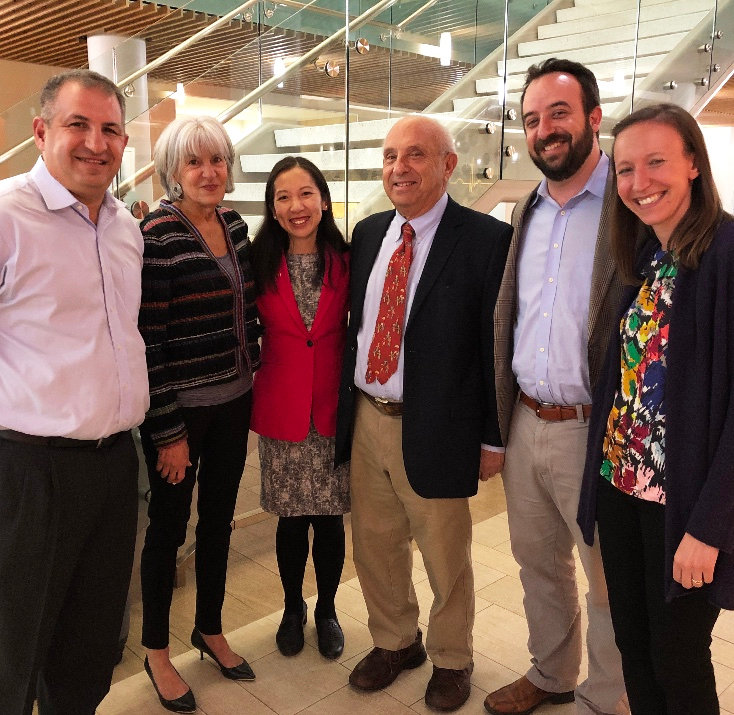A symphonic conversation with Dr. Leana Wen
Stressing the need to bring your authentic self when practicing medicine, Wen shared stories from her own life, to explain the choices she has made – as a young member of an immigrant family, as a medical resident, as a doctor, as a wife, and as a young mother
PROVIDENCE – After my father in law passed away in 1993, my mother in law, Marion Simon, wanted to honor his life and legacy through a gift to the then Brown Medical Program, now the Alpert Medical School.
In 1994 Marion endowed the Stanley D. Simon, MD Lecture and Forum, recognizing that becoming a doctor involves much more than the acquisition of pertinent knowledge. Each year a physician, who is also a humanist, is selected to address the medical students and share with them the importance of community and the physician’s place in society.
My father-in-law’s oft-repeated phrase, to “treat the patient and not the disease,” is more important today than ever.
This year our committee of mainly medical students selected Dr. Leana Wen as the Simon lecture speaker. She is currently the president of Planned Parenthood Federation of America and the Planned Parenthood Action Fund.
And now, please add “brilliant communicator” to her resume.
An authentic storyteller
The format for the “lecture” is actually a conversation with the speaker and one of the medical students [Connie Lu]. And it worked beautifully with Dr. Wen, who is a skilled storyteller.
She is the kind of leader who doesn’t shy away from sharing personal details of her life, who knows how to go to the left and right side of her audiences’ brains, and connects effortlessly with a crowd.
When my husband Peter and I were talking about the talk the next morning, he said Dr. Wen created a type of “symphonic” communication. She started with the strings section, then added horns, then percussion. There was an artistic quality to her remarks that is hard to put in writing.
Under siege
As one of the chief abortion rights advocates in our country, Dr. Wen talked about the need to treat abortion services and patients seeking these services, in the same manner that we treat patients seeking chemotherapy or diabetes services.
She reported on what’s happening in South Dakota and other states and the innumerable barriers to abortion services: an 800-word document full of medically inaccurate information that physicians have to read out loud to the patient; the travel distances of 250 miles each way some women have to undergo to find a provider, the 72-hour waiting period after the initial visit before an abortion can be performed; and the need for Planned Parenthood to provide earplugs and goggles to patients who have to undergo the required ultrasound prior to the abortion.
“The calvary’s not coming, this is the fight of our lives,” she told the medical students.
A braiding of life stories
Dr. Wen also shared her experiences as an immigrant, arriving in the U.S. at age 7. The women in her family went to Planned Parenthood for their health and reproductive care, so she is enormously proud of the work being done at the organization that was so instrumental in her family’s lives.
She poignantly talked about the failure of our medical care system to properly diagnose and treat her mother when Dr. Wen was a resident and her mother was only 44. She told us how difficult it was for her mother to question the physician for fear that he would “fire” her, and how a misdiagnosis was most likely responsible for her mother’s premature death.
Her own story
One of the questions Dr. Wen said that she is often asked is about her own personal abortion experience. She said that although she’s never had an abortion, she has had to address her own reproductive/pregnancy needs in sometimes very painful ways. What sexually active woman who is having sex with men can’t relate to worries about reliable birth control methods, a period that is late, and fears over being pregnant when you don’t want to be?
Yet years later many women want to become pregnant and can’t, often facing insurmountable obstacles, medical interventions and sometimes huge disappointments.
Dr. Wen had the ability to weave the story of immigration, reproductive needs, abortion services, and social justice into a story of advocacy and humanism. She had the ability to start from 35,000 feet in the air and then bring it all down to sea level, in an accessible way, that addressed the political, the social and the emotional aspects of the work that needs to be done.
Wen spoke in a soft but determined voice; she held the standing-room-only crowd of mostly medical students in rapt attention. We all listened and heard what she had to say. The conversation ended with Dr. Wen looking earnestly at the audience and saying: “We will look back at this time when everything was at stake, and ask, ‘Where was I?’”
Toby Simon is a frequent contributor to ConvergenceRI.






